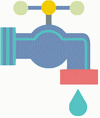|
Home Water Filter
|
Lighten Your Toxic Load:
Get a Home Water Filter and Drink CLEAN Water
 |
I personally use a home water filter because
- I hate the idea of filling up the landfills with plastic bottles.
- It's cheaper than drinking bottled water.
- Estrogen-mimicking compounds in plastic could leak into my water and, I fear, affect my health.
(Read what National Geographic's Green Guide has to say about plastics and health.)
I'm someone who goes through at least two 32 oz. bottles of water/day. Translation?
730 bottles/year for the landfill, as a result of my "drinking habit," were I to drink bottled water. So I simply use my home water filter to fill and refill my stainless steel water bottles.
Why filtered water? Why don't I just fill my water bottles with tap water?
I want to avoid as many toxins as I can!
Tap water can be contaminated with:
- micro-organisms
- parasites
- excess minerals
- fertilizers
- chemicals
...all of which might compromise your health. And most municipal water sources add chlorine.
Yes, it kills the micro-organisms. But now you're essentially drinking bleach.
You should be concerned with what's in your water too!
Maybe you already are
If you drink bottled water, you probably already care about water quality. (You probably also like to prioritize drinking water over, say, soda.)
Many people buy bottled water, thinking it's superior to tap water, when in reality, bottled water only has to meet the same standards as municipal drinking water.
So there's another reason to consider home filtering: cost. What are you (and your family) spending on bottled water each day? How much does that add up to in a year?
Water out of your faucet is of course much cheaper. So using a home water filter can pay for itself pretty quickly. (I just bought a $60 filter for my new home. Cheap! If I spend just two bucks a day on bottled water, this water filter can pay for itself in a month!)
Another benefit: I don't know too many people who use bottled water for cooking. When the filtered water comes out of your faucet, you won't think twice about doing so!
Take time to find out what's in your water
I live in Tucson, AZ, USA, so what's in the water I drink is different from what's in the water where you live, because it comes from different sources and is treated differently.
In the U.S., if you have a municipal water supplier they must provide an annual report disclosing your local water quality, including the water's source and the contaminants found in it.
Find information about your local drinking water.
Once you've reviewed your annual water report, you'll know what contaminants (and what levels) are in your drinking water. Find out what's in your water, and then you'll know what you might want to remove with a home water filter. Not all water filters remove the same things!
(If you want to go the extra mile to find out what's in your water - your pipes could be leeching chemicals that the water company doesn't have to report - you can do a home water test.)
There are various types of home water filters to choose from
- Carafe
- Faucet-mounted
- Countertop
- Undersink
- Reverse osmosis
- Whole house
Carafe
Yays: Best for small amounts of water. Doesn't have to be installed.
Nays: Slow, tend to clog, and the filters don't last long.
Faucet-Mounted Water Filter
Yays: Easy to switch between filtered and unfiltered. Easy installation.
Nays: Water flow slows and not all faucets are compatible.
Countertop Water Filter
Yays: Best alternative for large amounts without changing your plumbing. Doesn't clog as much as carafes and faucet mounts.
Nays: Countertop can get cluttery. Not compatible with all faucets.
Undersink Water Filter
Yays: Absolute best for family sized amounts of water. Don't have to modify existing faucet.
Nays: Takes up undersink space and requires some plumbing changes. A new hole must be added to your sink/countertop to accomodate the dispenser.
Reverse-Osmosis Water Filter
Yays: This one results in the cleanest water and is the only filter certified to remove arsenic.
Nays: More plumbing modifications. Requires periodic sanitizing with bleach. Very slow and uses 3 to 5 gallons of water for every gallon of filtered water that comes out. (Not a very ecological option.) Takes up undersink space too.
|
Whole-House Water Filter
Yays: Best for making sure cleaner water comes out of every faucet! Long cartridge lifetime.
Nays: Limited in the types of contaminants it removes. You will need professional installation.
Whatever type of home water filter you decide on, don't forget to research what contaminants it removes! The goal is to take out the toxins that are specific to your water.
More on Home Water Testing.
More healthy eating.
Back to Personal Nutrition Guide Home.





